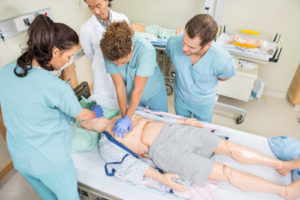This story was originally published by Chalkbeat. Sign up for their newsletters at ckbe.at/newsletters.
Lillian Atunu supports her four children working overnight shifts as a certified nursing assistant, but she sees better pay and better hours on the horizon.
Through a program at Community College of Denver, she’s earning a new credential each semester she goes to school, first in computer support technology and then in health care information technology. By stacking up those credentials, she has the potential to earn far more than the roughly $36,000 a year she earns now with overtime.
“It makes me so happy because it was just baby steps to get one thing, and so much opened up to me,” said Atunu, who starts an IT work-study job at CCD next week to get on-the-job technology experience.
Colorado lawmakers hope to open up clear pathways to degrees and credentials that lead to good-paying jobs for thousands more people. A package of bills unveiled Tuesday and backed by Gov. Jared Polis lays out how the state will spend roughly $95 million in federal relief money to improve access to higher education and connect education to in-demand jobs.
At a press conference, Polis described a middle-class lifestyle that’s increasingly out of reach for many Americans: a nice home, two cars, a vacation once or twice a year.
“Those opportunities are here,” he said. “And what we hope to accomplish is to really make sure that people can access the skills they need to unlock that opportunity.”
State Rep. Julie McCluskie, a Dillon Democrat, said she believes these programs have the potential to be “transformational” in a highly educated state that does a poor job creating college opportunities for high school graduates and returning adult students alike.
The package of bills implements recommendations of a commission formed last year to tackle thorny problems in higher education access.
“Last spring, as we were coming out of the pandemic, we recognized that with additional funding from the federal government, we could do something different, we could reimagine how we help students succeed and how we revitalize our workforce,” she said. “This is our chance to do something different to transform how we’ve been approaching that workforce development pipeline.”
The bulk of the money, $91 million, will go toward a competitive grant program for collaboratives of colleges, K-12 school districts, and employers to tailor courses and training to meet the needs of employers and provide students ways to earn credentials more quickly.
The hope is that the federal money will cover the start-up costs of programs that will become sustainable over time.
Another $3 million would go toward creating a data tracking system and public dashboard that shows which college programs are helping people get a good return on their investment. And $1.8 million would go toward allowing students to earn what are known as stackable credentials, such as the health care IT program Atunu is pursuing.
The lasting impacts of the pandemic loom over these efforts. Lawmakers want to help women who had to leave the workforce to care for children and community college students who set school aside to support their families find a way back into the classroom and then into better-paying jobs.
But they’re also trying to address long-standing problems, opening doors for high school students who aren’t interested in a four-year degree and for working adults who need a degree to advance in their field or change careers.
“We want learners wherever they are in the spectrum to be able to come in and exit with a credential that counts for something so that they are on the most efficient and effective pathway toward a degree,” said state Sen. Rachel Zenzinger, an Arvada Democrat.
Atunu said her priority was finding an opportunity in her field where she could advance quickly.
“I wanted to reinvent myself, and I wanted to go beyond being a CNA,” she said. “I came up with community college. It’s not expensive, and I can get something within a short time.”
The new proposals build on programs rolled out last year, also with federal money, to expand scholarships for adult students and provide them with coaches to help navigate college choices.
Day Grayson needed a new job during the pandemic and landed at Pikes Peak Community College, where she is getting a certificate in medical billing and coding with support from the Colorado Opportunity Scholarship Initiative. Her degree will allow her to train other people as well.
She attended the press conference with her coach from the Finish What You Started program, Nekedra Danyelle Bullock. Bullock works with students to pick programs and build schedules that work with their lives and goals.
Grayson said Bullock did much more than connect her with financial resources. She’s helped her understand her options and provided emotional support along the way.
“Without their knowledge of the avenues, I wouldn’t have known anything,” she said.
Chalkbeat is a nonprofit news site covering educational change in public schools.
